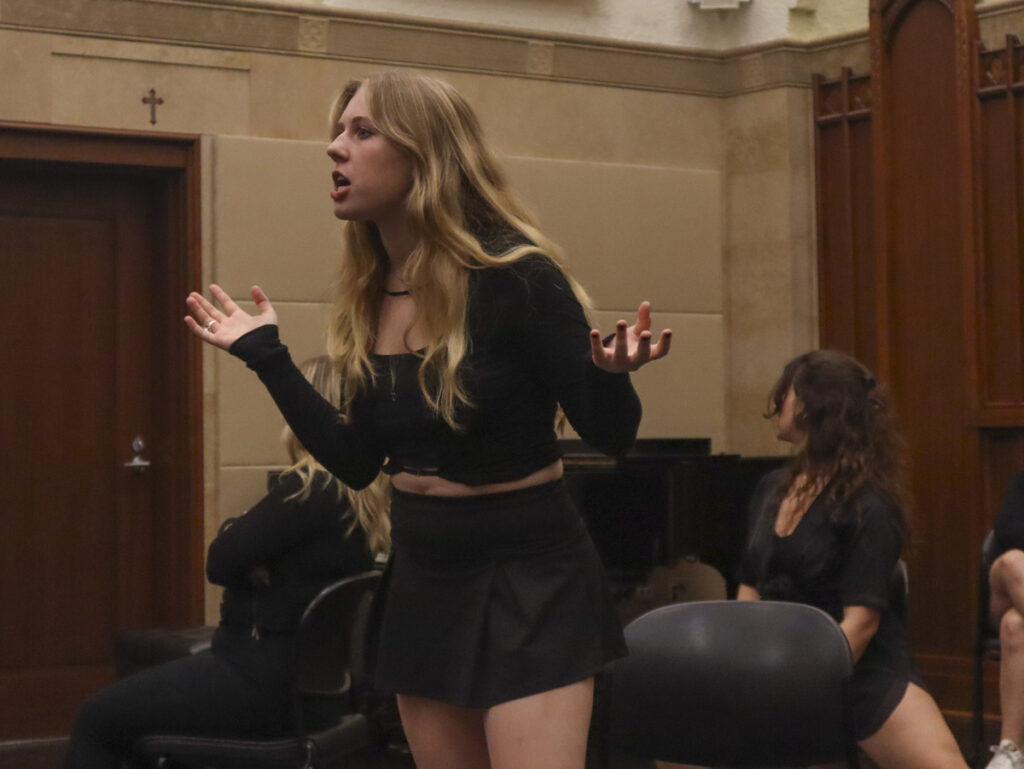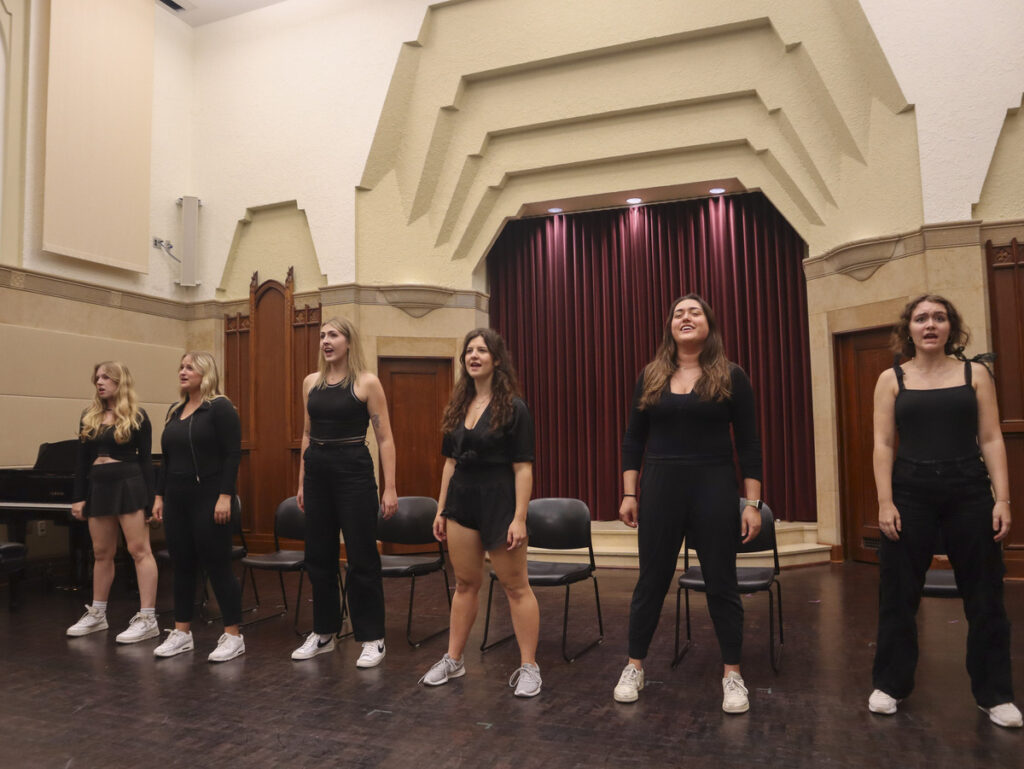“Life is a Cabaret,” a student-run performance, explores the nuances and struggles of everyday life.
Come to the Cabaret: Second Stage Laboratory Project Performance Explores Musical Theater as Storytelling
Content warning: Mention of suicide, murder
Absent the usual pageantry of theater but not its style and flair, an expansive catalog of musical songs provided the perfect medium for the performers of “Life is a Cabaret” to explore the nuances and struggles of everyday life.
The show took place on Sept. 16 in the Skowronski Music Hall in Mundelein Center for Fine and Performing Arts as a part of Loyola’s Second Stage Laboratory Program in the Department of Fine and Performing Arts. A cabaret is a show where cast members perform live comedy, sing or dance and are usually hosted in nightclubs or restaurants.
Through a revolving setlist of musical theater hits, the show examined the way modern audiences interact with musical theater, challenging the notion that these songs can only exist within the context of their respective shows.
Storytelling is also central to the exigence of the show — it amplifies the narrative-crafting power musical theater has. Each song featured in “Life is a Cabaret” is a story in a bottle, understandable without prior context and easily applicable to common challenges and feelings that arise throughout young adulthood.
The program intends to allow theater students to experiment with the ideas and theories presented within their classes on the stage, according to their website.
The show featured seven performers, including project lead Phoebe Ludwig. Each member performed a solo song, with two numbers performed by the entire group.

The performers all adopted a character, one that seemed loosely based on their actual selves. Throughout the performance, this blend of character and the individual underneath gave each song an air of performative realism, enhancing the show’s sincerity as a student-developed piece.
In the absence of sets and theater lighting, both the characters and the performers felt closer to the ground and provided a space to project their own emotional journey. Accompanied principally by a piano and an occasional backing track, the performance felt emotionally raw.
Before each number, the performers introduced the song as a caricatured version of themselves. In one example, Jasmina Guerra spoke about making the choice to move halfway across the country to pursue her dream before performing her song, “I Didn’t Plan It.” The brief monologue was clearly drawn from personal experience, and the accompanying song was meant to showcase the emotions that come along with that experience.
The show opened with a group performance of “Cabaret” from the musical of the same name. “Cabaret” follows the lives of the patrons of a nightclub in 1930s Berlin against the backdrop of the rise of the Nazis in Germany.
While the song is typically performed solo, the group instead opted to share the lines and sing in succession.
“Come hear the music play’ / ‘Life is a cabaret, old chum,” the group sang in unison.
The performance was high energy and chuck-full of incredible vocal performances from all cast members.
Ludwig kicked off a series of solo performances with “Colored Lights” from the musical “The Rink” about a mother looking to sell her run-down roller rink when her daughter re-enters her life looking to reconnect with the people from her hometown.
The performance captures the experience of living an unfulfilling life by chasing an intangible sense of contentment. Ludwig paced back-and-forth across the stage, pausing only for brief moments of emotional clarity about the reality of her situation.
Guerra’s rendition of “I Didn’t Plan It” from the musical “Waitress” was one of the stand-out performances. The musical delves into the life of a baker and waitress looking to escape an abusive relationship through the prize money awarded at a pie-baking contest.
Many of the performers touch on grappling with a fear of decision-making in early adulthood, and “I Didn’t Plan It” cemented this aim.
Marisa Graybill’s performance of “Times are Hard for Dreamers” from “Amélie” beautifully encapsulated the optimism of starting anew in a new location. “Amélie,” based on the French film “Le Fabuleux Destin d’Amélie Poulain,” describes the life of the film’s quiet and eccentric main character through the voices of those around her.
Graybill pushes through internal doubts and fears the song tackles amidst a bouncy piano, bringing the same glittery tone to each new apprehension before ultimately surmounting it.
Katie McCormick performed “Requiem” from “Dear Evan Hansen,” a musical about a high school boy who fakes his connection with someone in his grade who recently died by suicide. Her performance perfectly conveyed the emotional turbulence that comes with the process of grieving someone who might not deserve the reverence they’ve been given after death.

McCormick masterfully conveyed her inner turmoil through her tone and actions, beginning soft and unsure then slowly shifting to stronger vocal and physical presence.
“Pretty Funny” from the musical “Dogfight,” performed by Grace Anderson, explores the ritual humiliation women often face at the hands of men looking to demean the women they’re pursuing for entertainment.
Anderson’s voice was almost flute-like in its sound, smoothly fluttering between high and low vocal ranges.
“Cabaret” the musical made a third appearance during Ellie Kummer’s fantastic rendition of “Maybe This Time.” Her control of volume made the performance stand out, starting low before building to a louder, prouder finish by the end of the song.
The second group number, “Cell Block Tango” from “Chicago,” brought variety to the content of the show. The song follows six women all held in Cook County Jail for the murder of their husbands, all of which they defend throughout the song.
“It was a murder (squish) / But not a crime,” they sang together.
Nothing short of delightful, the number was an incredible showcase of both the individual and group talents of the performers. It was far more dance-heavy than the first, featuring spite-fueled chair choreography and a kickline.
Maddie Morrison was the first performer to sing in “Cell Block Tango” and brought that same passion to her solo performance of “I’d Rather Be Me” from “Mean Girls The Musical.” Used as a means of discussing the pressure young women are put under to fit in within society, Morrison brought a sense of self-understanding and confidence to the song.
“Life is a Cabaret” was an in-depth look at how musical theater is culturally defined and argues for a look through the lens of both personal connection and storytelling prowess. The show conveys that these songs are not just repertoire or audition fodder but exercises in meaningful narrative building and avenues for the personal expression of performers and avid fans alike.
The next Second Stage Laboratory performance will be “Without Words” by Hemani Mehta.
-

Audrey Hogan is a third-year student from Morgan Hill, California studying Communications and Political Science. This is her third-year as a writer and second-year on staff as Engagement Editor. She's written about the perils of academic pedigree, table tennis and Peter Gabriel, too. In her free time, she likes to read and walk.
View all posts
Topics
Get the Loyola Phoenix newsletter straight to your inbox!


